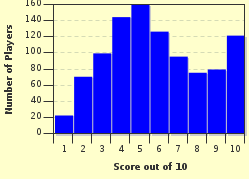Quiz Answer Key and Fun Facts
1. Alongside Dozy, Beaky, Mick and Tich, this English musician spent more weeks in the UK singles chart than The Beatles between 1965 and 1969. Their biggest hit both in the UK and the US was "The Legend of Xanadu" which hit number one in the UK. A former policeman who attended the scene when Eddie Cochran was killed in 1960, he lost a long battle with prostate cancer on January 9th, 2009. Who was he?
2. January 16th saw the passing of a lawyer, playwright and author who created a lovable and crumpled barrister much like himself. He also gave the world the phrase, "she who must be obeyed". As a lawyer he became famous for his role in several obscenity trials whilst his career as a writer, which began in 1947, is best remembered for "Rumpole of the Bailey" which made its TV debut in 1975. Who was this man?
3. Described by Martin Amis as "one of the great American novelists of the 20th century", this writer's prolific output also included collections of poetry, short stories and literary criticism. His novels included "The Witches of Eastwick" and the "Rabbit" series. Who was this giant of American literature who passed away on January 27th, 2009?
4. On January 30th, 2009, the world lost a man who had caused one of the greatest shocks in boxing history. His victory over Floyd Patterson in 1959 made him the first European holder of the world heavyweight title for more than twenty years. Who was this Swede who claimed Olympic silver in 1952?
5. February 4th: The illustrious career of this pioneering ornithologist took him to Oxford University, Trinidad, the Galapagos Islands and the Natural History Museum in London. His contributions to the understanding of several species of birds, including the manakin and the cotinga, led to him being commemorated in the naming of a genus of tropical birds. Who was this leader in his field whose name was unsuited to such tropical areas?
6. After years of campaigning for change in her country, this woman finally saw her husband sworn in as Prime Minister of Zimbabwe on February 11th, 2009. Less than a month later, on March 6th, she was to lose her life in a car crash 45 miles south of the capital city, Harare. Who was this woman who was described by her supporters as "a mother figure for the whole nation"?
7. March 18th: A fall during a skiing lesson in Quebec led to a tragically early demise for this English actress. Winner of a Tony for Best Actress for her performance in the 1998 Broadway revival of "Cabaret", her film roles included the title role in "The Handmaid's Tale" (1990) and "The Parent Trap" (1998) alongside Lindsay Lohan. Who was she?
8. A much-loved former politician passed away on April 15th. As well as that unusual standing, this humorist and radio personality counted chef, journalist and children's author amongst his previous careers. Born in Germany in 1924, the grandson of a legendary psychological pioneer, who was this modern Renaissance man?
9. April 19th saw the death of a prolific and unique Shanghai-born English author. Part of the "New Wave" movement of science fiction novelists that began in the 1960s, he was probably best known for two of his novels that were adapted into Hollywood movies, "Empire of the Sun" and "Crash". Who was he?
10. On April 22nd Britain lost one of the greats of its film history. Perhaps not as much of a household name as those he worked for or those he photographed, he was nevertheless very highly regarded by those familiar with his work. Though he was a director, it was as a cinematographer that he gained the greatest renown, working with Hitchcock, John Huston and Michael Powell. He earned his first Oscar win for his work on the latter's "Black Narcissus" (1947). Who was he?
Source: Author
Snowman
This quiz was reviewed by FunTrivia editor
DakotaNorth before going online.
Any errors found in FunTrivia content are routinely corrected through our feedback system.

